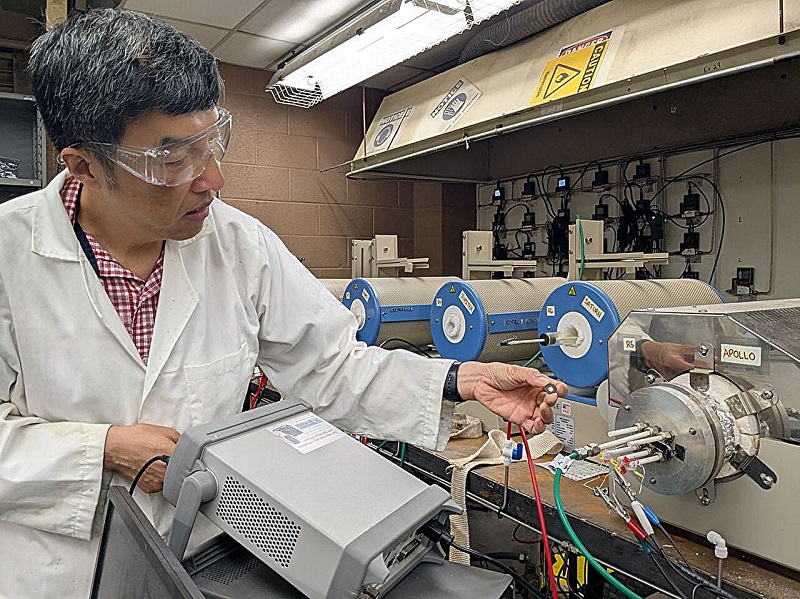To build a modern-day electrical grid with the flexibility and resilience to handle ebbing and flowing energy sources like solar and wind power, West...
Vous n'êtes pas connecté
Headings :
 - TECHXPLORE.COM - RSS news feed - 25/06/2024 13:23
- TECHXPLORE.COM - RSS news feed - 25/06/2024 13:23
Harvesting unused micro-vibration to generate electricity
Energy Harvesting is a green technology that captures (or "harvests") wasted energy and converts it into electricity. The ubiquitous vibrations that surround us are one of the promising sources for energy harvesting. In particular, vibration energy harvesting has recently gained significant attention as a next-generation power supply technology because it can generate power consistently, unaffected by weather or terrain conditions.
Articles similaires
Tough fuel cell can stabilize power grid by making and storing energy in extreme industrial conditions
To build a modern-day electrical grid with the flexibility and resilience to handle ebbing and flowing energy sources like solar and wind power, West...
Enhanced geothermal systems: An underground tech surfaces as a serious clean energy contender
A once-overlooked technology that taps into the Earth's heat to generate electricity could supply up to 20% of the electricity in the United States by...
Enhanced geothermal systems: An underground tech surfaces as a serious clean energy contender
A once-overlooked technology that taps into the Earth's heat to generate electricity could supply up to 20% of the electricity in the United States by...
A super-strong fuel cell could help balance the power grid—and it runs on water
As the world shifts toward clean energy sources like solar and wind, managing the power supply becomes a serious challenge. These sources don’t...
An underground tech surfaces as a serious clean energy contender
Fervo Energy’s Cape Station enhanced geothermal site located near Milford, Utah. Credit: Fervo Energy A once-overlooked technology that taps into...
Using Lightning To Make Ammonia Out Of Thin Air
University of Sydney researchers have harnessed human-made lightning to develop a more efficient method of generating ammonia – one of the...
Floating Nuclear Power Plants To Be Evaluated For Mediterranean
The American Bureau of Shipping, Core Power and Athlos Energy are to collaborate on the evaluation of the potential of deploying floating nuclear...
Floating Nuclear Power Plants To Be Evaluated For Mediterranean
The American Bureau of Shipping, Core Power and Athlos Energy are to collaborate on the evaluation of the potential of deploying floating nuclear...
Enerjisa Şirinçavuş (Bandırma II) Natural Gas Combined Cycle Power Plant: Efficiency, Environmental Sensitivity, And Role In Turkey’s Energy Strategy – OpEd
Turkey's growing electricity demand and carbon reduction targets have made efficient and environmentally friendly power plants increasingly...
Latest releases
-
Amazon Prime Day 2025 Delivers Record Sales and Savings in Expanded Four-Day Shopping Event
AMAZON - 12/07/2025
-
DHS Reveals Criminal Histories of Illegal Aliens Detained at Prairieland Detention Center at Time of July 4 Attack
The Department of homeland security - 11/07/2025
-
Henson Group and myCloudDoor Merge to Form ALIANDO, a Leading, Global Microsoft Partner
Henson Group - 10/07/2025
-
Their ability to enter and operate in the United States emphasized the danger of letting violent offenders exploit our border—and reinforces why the Trump Administration refuses to let its guard down. HSI Omaha led the operation with support from federal and international law enforcement partners. ICE currently holds both individuals in custody. The agency has initiated removal proceedings and will continue coordinating with El Salvadoran authorities to send them back to face justice.
The Department of homeland security - 10/07/2025
-
Their ability to enter and operate in the United States emphasized the danger of letting violent offenders exploit our border—and reinforces why the Trump Administration refuses to let its guard down. HSI Omaha led the operation with support from federal and international law enforcement partners. ICE currently holds both individuals in custody. The agency has initiated removal proceedings and will continue coordinating with El Salvadoran authorities to send them back to face justice.
The Department of homeland security - 10/07/2025
-
ICE Takes Down High-ranking MS-13 Gang Leaders Wanted for Murder
The Department of homeland security - 10/07/2025
-
Buy with Prime Expands with New Brand Dr. Berg Nutritionals
AMAZON - 09/07/2025
-
DHS Sends Administrative Subpoenas to Harvard University
The Department of homeland security - 09/07/2025
-
ICE Arrests Criminal Illegal Alien Sex Offenders and Pedophiles in Minneapolis
The Department of homeland security - 09/07/2025
-
ICE Arrests Criminal Illegal Alien Sex Offenders and Pedophiles in Minneapolis
The Department of homeland security - 09/07/2025

